Module 9 Population Unit 2 Arnwick was a city with 200,000 people 课件(共40张)
文档属性
| 名称 | Module 9 Population Unit 2 Arnwick was a city with 200,000 people 课件(共40张) | 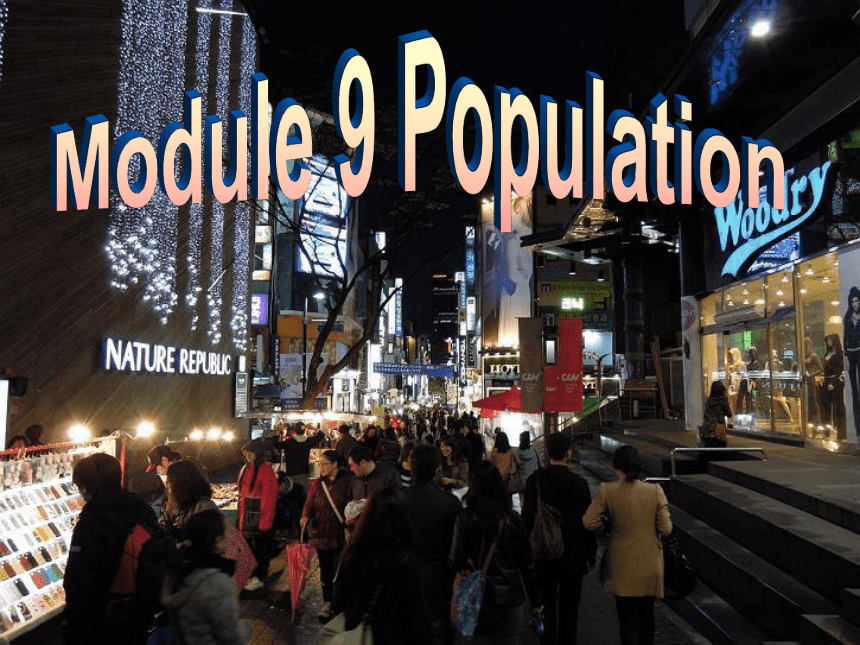 | |
| 格式 | pptx | ||
| 文件大小 | 6.7MB | ||
| 资源类型 | 教案 | ||
| 版本资源 | 外研版 | ||
| 科目 | 英语 | ||
| 更新时间 | 2020-08-02 16:54:59 | ||
图片预览

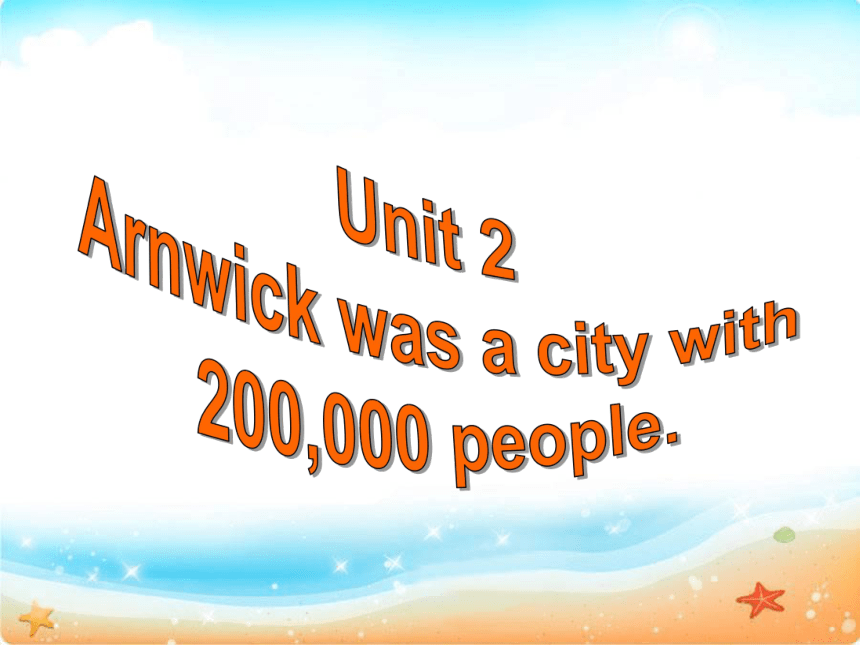
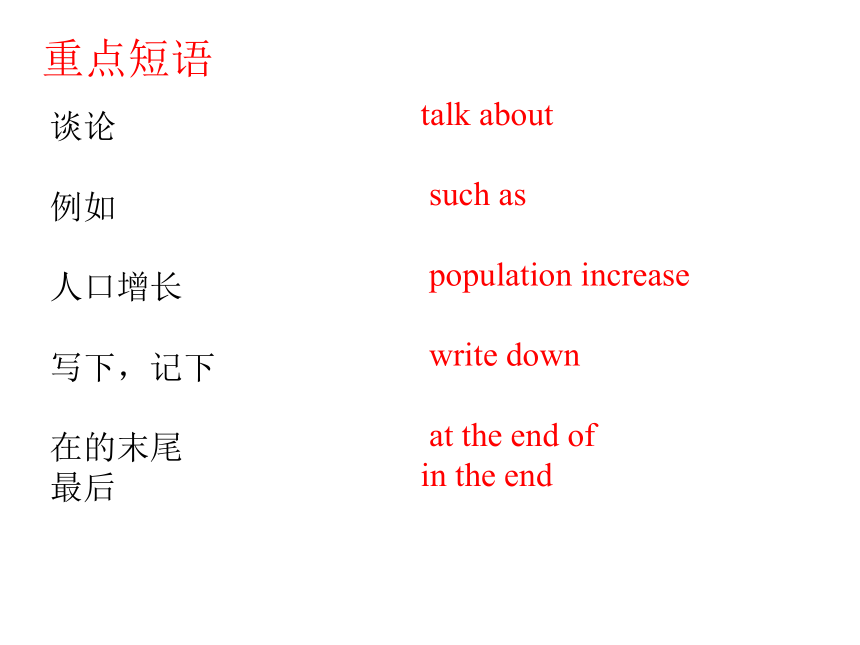
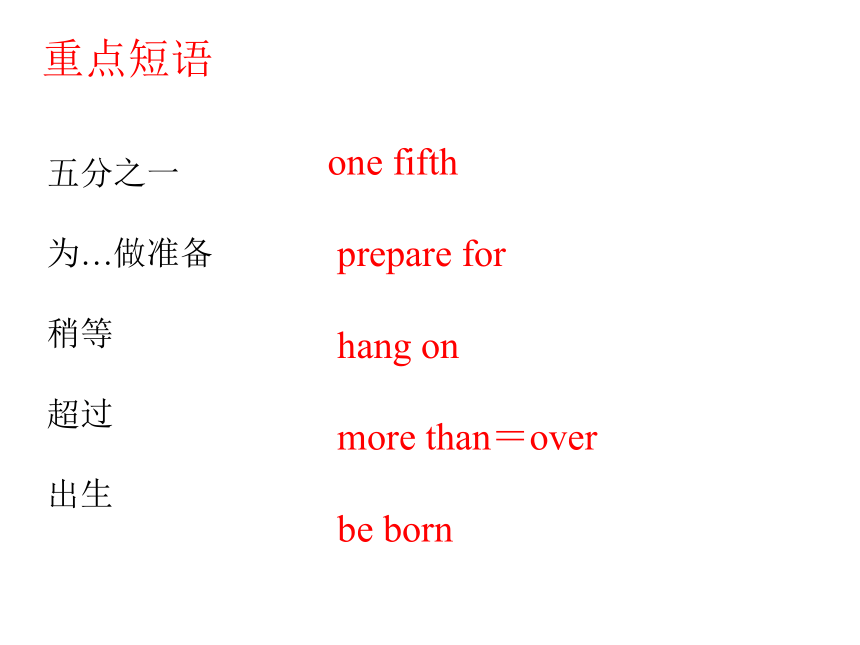
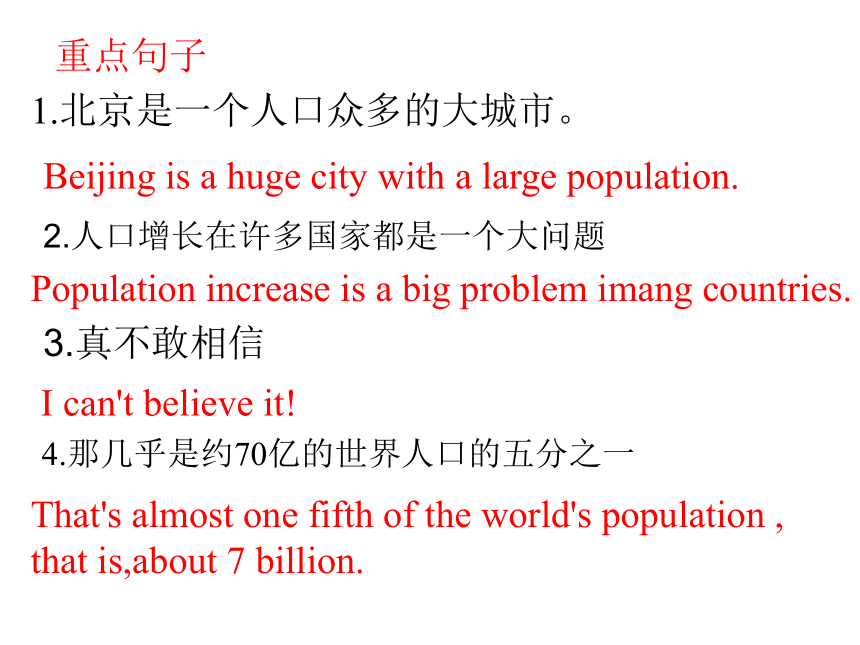

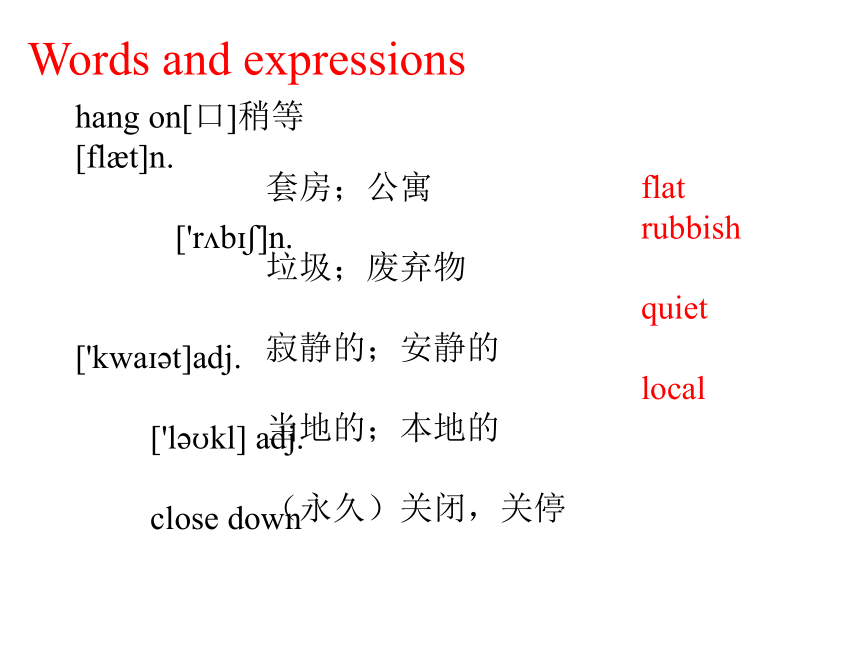
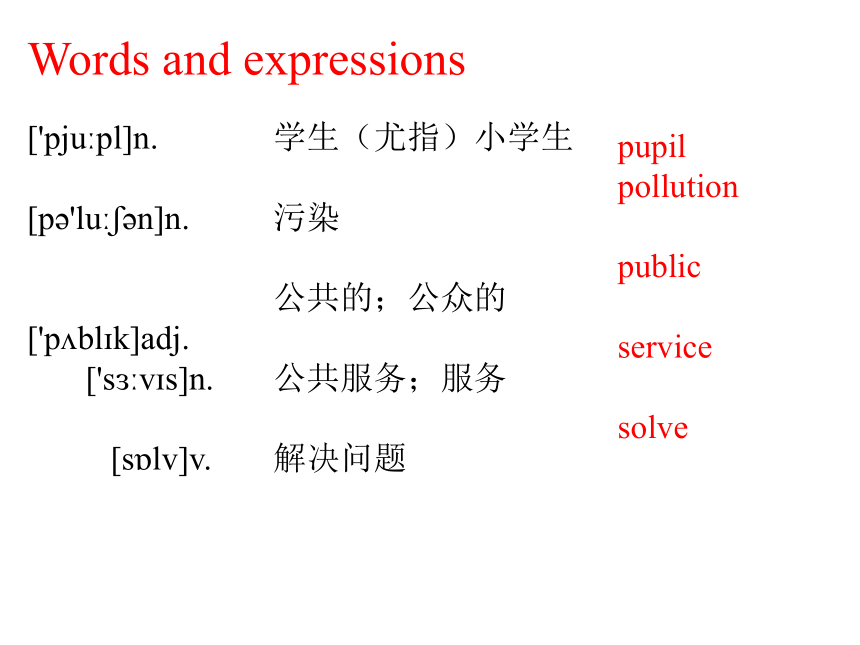

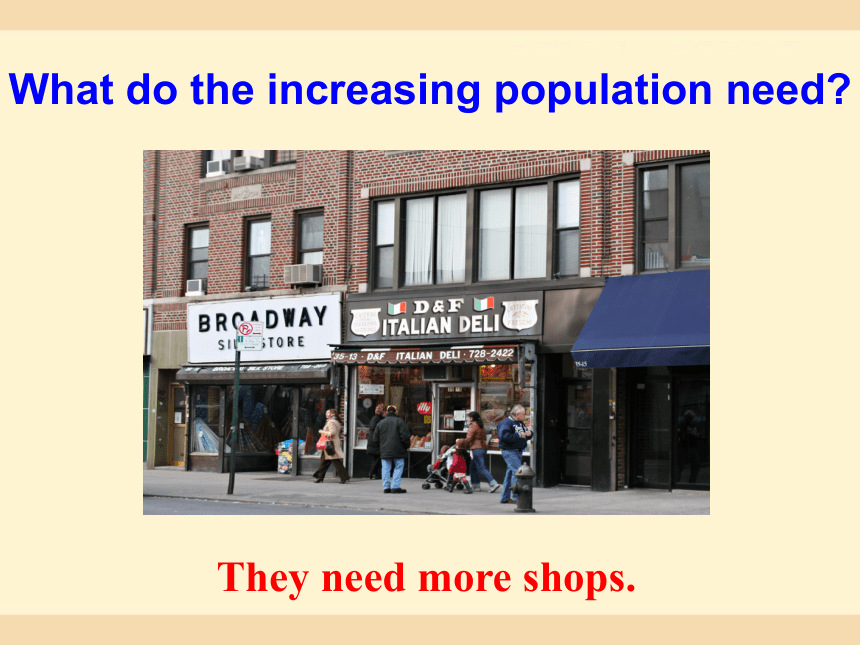

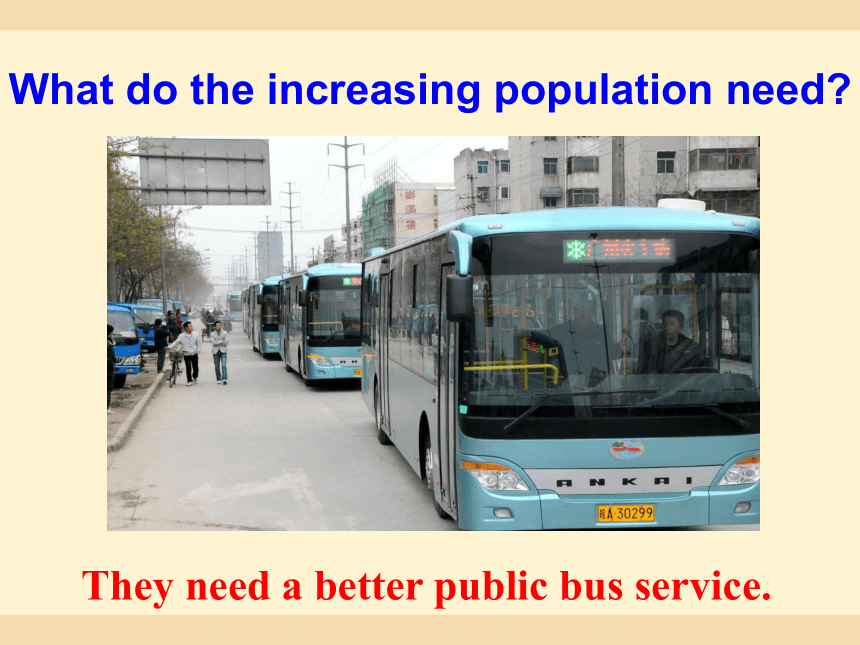
文档简介
Module 9 Population
Unit 2
Arnwick was a city with
200,000 people.
重点短语
talk about
such as
population increase
write down
at the end of
in the end
谈论
例如
人口增长
写下,记下
在的末尾
最后
重点短语
one fifth
prepare for
hang on
more than=over
be born
五分之一
为…做准备
稍等
超过
出生
重点句子
1.北京是一个人口众多的大城市。
Beijing is a huge city with a large population.
2.人口增长在许多国家都是一个大问题
Population increase is a big problem imang countries.
3.真不敢相信
I can't believe it!
4.那几乎是约70亿的世界人口的五分之一
That's almost one fifth of the world's population ,
that is,about 7 billion.
5.稍等!我要把这点也记下来
Hang on a minute!I'll write that down too!
hang on[口]稍等
[fl?t]n.
['r?b??]n.
['kwa??t]adj.
['l??kl] adj.
close down
flat
rubbish
quiet
local
Words and expressions
套房;公寓
垃圾;废弃物
寂静的;安静的
当地的;本地的
(永久)关闭,关停
['pju?pl]n.
[p?'lu???n]n.
['p?bl?k]adj.
['s??v?s]n.
[s?lv]v.
pupil
pollution
public
service
solve
Words and expressions
学生(尤指)小学生
污染
公共的;公众的
公共服务;服务
解决问题
What do the increasing population need?
Lead-in
They need more flats.
What do the increasing population need?
They need more shops.
What do the increasing population need?
They need more hospitals.
What do the increasing population need?
They need a better public bus service.
flat
quiet
local
rubbish
solve
pupil
Do you know these words?
pollution
public
service
√
√
√
Read the whole article check the true sentences.
1. Parkville was a quiet village.
2. Arnwick was a city with 20,000 people.
3. Arnwick now has a population of more
than one million.
4. The local school in Parkville has 2,000
pupils.
5. Big cities need more money for public
services.
Fast reading
1. Why do people move to cities?
Because they want to find jobs in cities.
Careful reading
Read paragraph 1-2 and answer questions.
2. Where did people live after they moved to cities?
They lived in flats outside the centre.
3.Where does Jo’s family live now?
In one of those flats.
Retell
Jo is fifteen and ......Parkville.When Jos grandparents first ...... Parkville, it was a quiet village. They had ....... close to .......
Parkville was near Arnwick, ....... People from Parkville ......Arnwick to find jobs, and they needed places ....... However, ...... in the city centre, so the government built flats ....... Soon, Parkville became ......Arnwick, and Arnwick became a city ......over a million people. Jo's family lives in ...... those flats. It is very crowded, and rubbish is also a problem
1. When did the small local school in Parkville close down?
Five years ago.
Read paragraph 3 and answer questions.
2.How long will it take to go to school in Arnwick?
An hour.
Retell
The small local school in Parkville ...... five years ago, so Jo now ...... a school in Arnwick ...... 2,000 pupils. It ...... an hour to get there ....... There is ...... traffic and pollution
Read paragraph 4-5 and retell these two natural passages .
...... Arnwick needs ...... schools, buses and hospitals. It ...... fresh air, clean water and better public services. It ...... more police to protect its people. But to do all these things, it ...... more money
......, ...... money help solve all these problems? ...... we need more big cities like this? ......, this is just a story. ...... it describes ...... is happening ....... Could it be your town ......?
flat local pollution
rubbish service thousand
Many towns and cities have the same problems as Arnwick. People need places to live, so the (1) ____ government has to build more (2) ____.
local
flats
Complete the passage with the correct form of the words in the box.
People need better bus and train (3) _______. They also produce more (4) _______, so the government has to make more efforts to protect the city against (5) ________. As we say, a hundred people make a (6) ________ problems!
services
rubbish
pollution
thousand
( ) Many young people want to leave the countryside because they want to find jobs in the city.
( ) There are not enough schools and hospitals.
Read and check the problems that exist in your home town.
Writing
( ) Too much traffic brings air pollution.
( ) There is too much rubbish in the
streets.
( ) There aren’t enough police in the
city.
( ) It’s difficult to get enough clean
water.
冠词有三种形式:不定冠词 a(n), 定冠 the
和零冠词。
一、不定冠词的用法。
首次提到某人某人, 不定冠词起介绍作用。
e.g. I’m preparing some notes for a report.
我正在为一个报告准备笔记。
Grammer
冠词
2. 表示“每一”的概念,相当于 every。
e.g. I go to the cinema once a month.
我一个月去看一次电影。
3. 某些固定短语中,要用不定冠词。
e.g. have a good time, in a hurry, have a break
二、定冠词的用法。
1. 指前面提到过的人或物,或特指某人或某物。
e.g. I have a dog. The dog is brown.
2. 指谈话双方都知道的人或物。
e.g. I had to write the same report last
term!
3. 用于序数词以及形容词的最高级之前。
e.g. He went to the first floor.
4. 用于世界上独一无二的事物。
e.g. The sun is shining brightly.
5. 在江河、海洋、山脉等地理名词前及由普通名词构成的专有名词前。
e.g. the Great Wall of China
6. 用于表示方位名词前。
e.g. Guangdong is in the south of China.
7. 用在弹奏乐器中。
e.g. The boy is playing the piano.
8. 在某些形容词前加定冠词,表示一类 人或物。
e.g. The old are dancing on the
playground.
9. 在姓氏复数形式之前, 表示“一家人”或“夫妇两人”。
e.g. The Browns are really a large family.
10. 用于某些固定短语中。
e.g. by the way
三、零冠词。
1. 在球类活动、学科名称前,以及节日、月份、星期前不用冠词。
e.g. 1st June is Children’s Day.
2. 名词前已有指示代词、物主代词、不定冠词或数词等作定语的名词前不用冠词。
e.g. I have several questions to ask.
3. 在某些固定词组和习惯用语中不用冠词。
e.g. by bus at night in trouble
重点短语
one fifth
prepare for
hang on
more than=over
be born
五分之一
为…做准备
稍等
超过
出生
靠近
不再
不再
为…付钱
(永久)关闭,关停
事实上
close to
not.. any more= no more
not. any longer= no longer
pay for
close down
in fact
all over the world/around the world
as a result
at the start/ beginning of
比较级+and+比较级越来越
too much+不可数名词
too many+可数名词复数
全世界
结果;因此
在…的开头
太多…
太多…
重点句子
1.当乔的祖父母第一次来到帕克维尔时,他是一个安静的村庄
When Jo's grandparents first came to Parkville,it was a quite village.
2.帕克维尔靠近阿恩维克,阿恩维克是一座拥有20万
人口的城市
Parkville was near Arnwick,a city with 200000 people.
3.乔一家就住在其中一套公寓中
Jo's family lives in one of those flats.
4.沿途交通堵塞,污染严重
There is a lot of traffic and pollution.
5.乘公共汽车到那要花一个小时的时间
It takes an hour to get there by bus.
6.然而,钱能帮助解决所有的这些问题吗
However,can money help solve all these problems?
Write down your suggestions to solve the problems in your home town.
Thank you!
Unit 2
Arnwick was a city with
200,000 people.
重点短语
talk about
such as
population increase
write down
at the end of
in the end
谈论
例如
人口增长
写下,记下
在的末尾
最后
重点短语
one fifth
prepare for
hang on
more than=over
be born
五分之一
为…做准备
稍等
超过
出生
重点句子
1.北京是一个人口众多的大城市。
Beijing is a huge city with a large population.
2.人口增长在许多国家都是一个大问题
Population increase is a big problem imang countries.
3.真不敢相信
I can't believe it!
4.那几乎是约70亿的世界人口的五分之一
That's almost one fifth of the world's population ,
that is,about 7 billion.
5.稍等!我要把这点也记下来
Hang on a minute!I'll write that down too!
hang on[口]稍等
[fl?t]n.
['r?b??]n.
['kwa??t]adj.
['l??kl] adj.
close down
flat
rubbish
quiet
local
Words and expressions
套房;公寓
垃圾;废弃物
寂静的;安静的
当地的;本地的
(永久)关闭,关停
['pju?pl]n.
[p?'lu???n]n.
['p?bl?k]adj.
['s??v?s]n.
[s?lv]v.
pupil
pollution
public
service
solve
Words and expressions
学生(尤指)小学生
污染
公共的;公众的
公共服务;服务
解决问题
What do the increasing population need?
Lead-in
They need more flats.
What do the increasing population need?
They need more shops.
What do the increasing population need?
They need more hospitals.
What do the increasing population need?
They need a better public bus service.
flat
quiet
local
rubbish
solve
pupil
Do you know these words?
pollution
public
service
√
√
√
Read the whole article check the true sentences.
1. Parkville was a quiet village.
2. Arnwick was a city with 20,000 people.
3. Arnwick now has a population of more
than one million.
4. The local school in Parkville has 2,000
pupils.
5. Big cities need more money for public
services.
Fast reading
1. Why do people move to cities?
Because they want to find jobs in cities.
Careful reading
Read paragraph 1-2 and answer questions.
2. Where did people live after they moved to cities?
They lived in flats outside the centre.
3.Where does Jo’s family live now?
In one of those flats.
Retell
Jo is fifteen and ......Parkville.When Jos grandparents first ...... Parkville, it was a quiet village. They had ....... close to .......
Parkville was near Arnwick, ....... People from Parkville ......Arnwick to find jobs, and they needed places ....... However, ...... in the city centre, so the government built flats ....... Soon, Parkville became ......Arnwick, and Arnwick became a city ......over a million people. Jo's family lives in ...... those flats. It is very crowded, and rubbish is also a problem
1. When did the small local school in Parkville close down?
Five years ago.
Read paragraph 3 and answer questions.
2.How long will it take to go to school in Arnwick?
An hour.
Retell
The small local school in Parkville ...... five years ago, so Jo now ...... a school in Arnwick ...... 2,000 pupils. It ...... an hour to get there ....... There is ...... traffic and pollution
Read paragraph 4-5 and retell these two natural passages .
...... Arnwick needs ...... schools, buses and hospitals. It ...... fresh air, clean water and better public services. It ...... more police to protect its people. But to do all these things, it ...... more money
......, ...... money help solve all these problems? ...... we need more big cities like this? ......, this is just a story. ...... it describes ...... is happening ....... Could it be your town ......?
flat local pollution
rubbish service thousand
Many towns and cities have the same problems as Arnwick. People need places to live, so the (1) ____ government has to build more (2) ____.
local
flats
Complete the passage with the correct form of the words in the box.
People need better bus and train (3) _______. They also produce more (4) _______, so the government has to make more efforts to protect the city against (5) ________. As we say, a hundred people make a (6) ________ problems!
services
rubbish
pollution
thousand
( ) Many young people want to leave the countryside because they want to find jobs in the city.
( ) There are not enough schools and hospitals.
Read and check the problems that exist in your home town.
Writing
( ) Too much traffic brings air pollution.
( ) There is too much rubbish in the
streets.
( ) There aren’t enough police in the
city.
( ) It’s difficult to get enough clean
water.
冠词有三种形式:不定冠词 a(n), 定冠 the
和零冠词。
一、不定冠词的用法。
首次提到某人某人, 不定冠词起介绍作用。
e.g. I’m preparing some notes for a report.
我正在为一个报告准备笔记。
Grammer
冠词
2. 表示“每一”的概念,相当于 every。
e.g. I go to the cinema once a month.
我一个月去看一次电影。
3. 某些固定短语中,要用不定冠词。
e.g. have a good time, in a hurry, have a break
二、定冠词的用法。
1. 指前面提到过的人或物,或特指某人或某物。
e.g. I have a dog. The dog is brown.
2. 指谈话双方都知道的人或物。
e.g. I had to write the same report last
term!
3. 用于序数词以及形容词的最高级之前。
e.g. He went to the first floor.
4. 用于世界上独一无二的事物。
e.g. The sun is shining brightly.
5. 在江河、海洋、山脉等地理名词前及由普通名词构成的专有名词前。
e.g. the Great Wall of China
6. 用于表示方位名词前。
e.g. Guangdong is in the south of China.
7. 用在弹奏乐器中。
e.g. The boy is playing the piano.
8. 在某些形容词前加定冠词,表示一类 人或物。
e.g. The old are dancing on the
playground.
9. 在姓氏复数形式之前, 表示“一家人”或“夫妇两人”。
e.g. The Browns are really a large family.
10. 用于某些固定短语中。
e.g. by the way
三、零冠词。
1. 在球类活动、学科名称前,以及节日、月份、星期前不用冠词。
e.g. 1st June is Children’s Day.
2. 名词前已有指示代词、物主代词、不定冠词或数词等作定语的名词前不用冠词。
e.g. I have several questions to ask.
3. 在某些固定词组和习惯用语中不用冠词。
e.g. by bus at night in trouble
重点短语
one fifth
prepare for
hang on
more than=over
be born
五分之一
为…做准备
稍等
超过
出生
靠近
不再
不再
为…付钱
(永久)关闭,关停
事实上
close to
not.. any more= no more
not. any longer= no longer
pay for
close down
in fact
all over the world/around the world
as a result
at the start/ beginning of
比较级+and+比较级越来越
too much+不可数名词
too many+可数名词复数
全世界
结果;因此
在…的开头
太多…
太多…
重点句子
1.当乔的祖父母第一次来到帕克维尔时,他是一个安静的村庄
When Jo's grandparents first came to Parkville,it was a quite village.
2.帕克维尔靠近阿恩维克,阿恩维克是一座拥有20万
人口的城市
Parkville was near Arnwick,a city with 200000 people.
3.乔一家就住在其中一套公寓中
Jo's family lives in one of those flats.
4.沿途交通堵塞,污染严重
There is a lot of traffic and pollution.
5.乘公共汽车到那要花一个小时的时间
It takes an hour to get there by bus.
6.然而,钱能帮助解决所有的这些问题吗
However,can money help solve all these problems?
Write down your suggestions to solve the problems in your home town.
Thank you!
同课章节目录
- Module 1 How to learn English
- Unit 1 Let's try to speak English as much as possi
- Unit 2 You should smile at her.
- Unit 3 Language in use .
- Module 2 My home town and my country
- Unit 1 It's taller than many other buildings.
- Unit 2 Cambridge is a beautiful city in the east o
- Unit 3 Language in use .
- Module 3 Sports.
- Unit 1 Nothing is more exciting than playing tenni
- Unit 2 This year we training more carefully.
- Unit 3 Language in use .
- Module 4 Planes, ships and trains .
- Unit 1 He lives the farthest from school.
- Unit 2 What is the best way to travel.
- Unit 3 Language in use .
- Module 5 Lao She Teahouse.
- Unit 1 I wanted to see the Beijing Opera.
- Unit 2 It descibes the changes in Chinese society.
- Unit 3 Language in use .
- Module 6 Animals in danger.
- Unit 1 It allows people to get closer to them .
- Unit 2 The WWF is working hard to save them all.
- Unit 3 Language in use .
- Revision module A
- Module 7 A famous story
- Unit 1 Alice was sitting with her sister by the ri
- Unit 2 She was thinking about her cat.
- Unit 3 Language in use .
- Module 8 Accidents
- Unit 1 While the car were changing to red, a car s
- Unit 2 I was trying to pick it up when it bite me
- Unit 3 Language in use .
- Module 9 Population
- Unit 1 The population of China is about 1.37 billi
- Unit 2 Arnwick was a city with 200,000 people.
- Unit 3 Language in use .
- Module 10 The weathe
- Unit 1 It might snow.
- Unit 2 The weather is fine all year round.
- Unit 3 Language in use .
- Module 11 Way of life
- Unit 1 In China ,we open a gift later.
- Unit 2 In England, you usually drink tea with milk
- Unit 3 Language in use .
- Module 12 Help
- Unit 1 What should we do before help arrives?
- Unit 2 Stay away from windows and heavy furniture.
- Unit 3 Language in use .
- Revision module B
